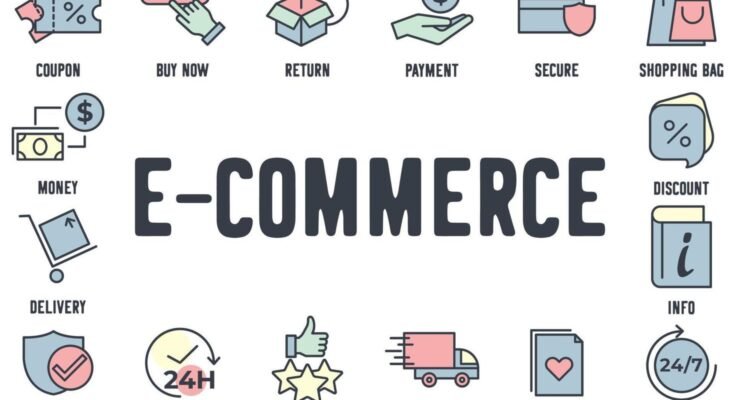Introduction: Rise of E-commerce
E-commerce , short for electronic commerce, refers to the buying and selling of goods and services over the internet. Over the last two decades, it has revolutionized the global retail landscape. What started as a convenient alternative to brick-and-mortar shopping has now evolved into a dynamic ecosystem that includes online marketplaces, direct-to-consumer (DTC) brands, mobile commerce, social commerce, and more.
The rise of e-commerce has revolutionized the way businesses operate and consumers shop. Over the past decade, the convenience of online shopping, coupled with advancements in technology and secure payment systems, has led to a significant shift from traditional brick-and-mortar stores to digital platforms. The rise of e-commerce has provided businesses with global reach, enabling them to tap into new markets and increase their customer base.
This rise of e-commerce has also been fueled by changing consumer behaviors, where people increasingly prefer the ease of shopping from home, especially with the growth of mobile devices and fast internet connections. As a result, e-commerce has become a dominant force in the retail industry, transforming not only how products are bought and sold but also how businesses engage with their customers.
What is E-commerce?
At its core, e-commerce enables businesses and consumers to transact online. It includes various business models:
- B2C (Business-to-Consumer): The most common form, like Amazon or Walmart.com.
- B2B (Business-to-Business): Businesses selling to other businesses, such as Alibaba or wholesale distributors.
- C2C (Consumer-to-Consumer): Platforms like eBay or OLX, where individuals sell to each other.
- C2B (Consumer-to-Business): Freelancers or influencers offering services to businesses.
With the advancement of technology and changing consumer behaviors, e-commerce has extended beyond desktop websites to mobile apps, voice-enabled devices, and even social media platforms.
Growth of E-commerce Worldwide
The e-commerce industry has experienced explosive growth. Global e-commerce sales surpassed $5.7 trillion in 2023, and the number continues to rise annually. Several factors contribute to this:
- Increased internet and smartphone penetration
- Secure online payment systems
- Convenience and 24/7 accessibility
- Pandemic-driven digital transformation
Countries like China, the United States, and the United Kingdom lead the way in online retail sales, while emerging markets like India, Brazil, and Southeast Asia are catching up fast.
Key Components
Understanding the essential components of an e-commerce ecosystem helps businesses build better online stores and customer experiences.
1. Website or Online Store
The foundation of any e-commerce business is its website or marketplace presence. A user-friendly, responsive, and secure platform is vital for success. Shopify, WooCommerce, Magento, and custom solutions are popular tools for building e-commerce stores.
2. Product Listings and Inventory
Proper product descriptions, high-quality images, pricing, and inventory tracking are essential. Customers rely on this information to make informed decisions.
3. Shopping Cart and Checkout
A seamless checkout experience with multiple payment options like credit/debit cards, digital wallets, and even Buy Now, Pay Later (BNPL) solutions boosts conversions.
4. Payment Gateway
Secure and fast transactions are handled by payment gateways such as Stripe, PayPal, Razorpay, and Square.
5. Logistics and Fulfillment
Shipping, warehousing, and order tracking are critical for customer satisfaction. Many e-commerce businesses use third-party logistics (3PL) providers like Amazon FBA or ShipBob.
6. Customer Service
Live chat, email support, and easy return policies build trust and long-term loyalty among customers.
Benefits of E.commerce
E-commerce brings immense advantages for both sellers and buyers:
For Businesses:
- Global reach with minimal infrastructure
- Lower operational costs than physical stores
- 24/7 availability and automated processes
- Real-time analytics and data insights
- Scalability with minimal overhead
For Consumers:
- Convenience to shop anytime, anywhere
- Wider variety of products
- Price comparisons across sellers
- Access to international brands
- Customer reviews and ratings for trust
E-commerce Marketing Strategies
To succeed in a competitive online environment, e-commerce businesses must adopt smart marketing strategies.
1. Search Engine Optimization (SEO)
Optimizing product pages and blog content helps attract organic traffic from Google.
2. Pay-Per-Click (PPC) Advertising
Platforms like Google Ads, Facebook, and Instagram allow businesses to target audiences based on demographics, behavior, and interests.
3. Email Marketing
Sending newsletters, promotional offers, and abandoned cart reminders can improve customer retention and sales.
4. Social Media Marketing
Platforms like Instagram, TikTok, and Pinterest have become powerful e-commerce tools, enabling brands to showcase products and run direct shopping campaigns.
5. Affiliate and Influencer Marketing
Partnering with influencers and bloggers can increase brand awareness and drive traffic.
Challenges in E-commerce
While e-commerce offers massive opportunities, it also comes with its own set of challenges:
1. Cybersecurity
Online fraud, data breaches, and phishing attacks can compromise customer trust and business reputation.
2. Customer Trust and Experience
Building loyalty without face-to-face interaction requires exceptional service and transparency.
3. High Competition
The digital marketplace is crowded, making it harder for small businesses to stand out.
4. Shipping Delays and Returns
Managing logistics efficiently, especially during holidays or crises, is a constant concern.
5. Changing Algorithms
Dependency on platforms like Google or Facebook means algorithm changes can impact visibility and traffic.
Future Trends in E-commerce
The e-commerce landscape continues to evolve rapidly. Here are the key trends to watch:
1. Mobile Commerce (M-commerce)
With more than 70% of traffic now from smartphones, optimizing for mobile is non-negotiable.
2. Voice Shopping
Smart assistants like Alexa and Google Assistant are enabling hands-free shopping experiences.
3. Augmented Reality (AR)
AR allows customers to visualize products like furniture, clothing, or makeup before purchase, reducing returns.
4. AI and Chatbots
Artificial intelligence helps personalize recommendations, automate support, and improve the overall shopping journey.
5. Sustainable and Ethical Shopping
More consumers are looking for eco-friendly packaging, fair-trade goods, and ethical brands.
6. Subscription Models
From snacks to skincare, subscription e-commerce is booming due to its convenience and predictability.
7. Cryptocurrency and Blockchain
Decentralized payments and blockchain-based tracking systems may soon become integral to global e-commerce.
E-commerce Platforms to Consider
Here are some of the most popular platforms for launching or growing an online store:
| Platform | Best For | Key Features |
|---|---|---|
| Shopify | Beginners & fast setup | Easy drag-and-drop builder, app integrations |
| WooCommerce | WordPress users | Open-source, customizable, SEO-friendly |
| Magento | Large enterprises | Highly customizable, robust backend |
| BigCommerce | Growing businesses | Built-in features, scalable |
| Wix eCommerce | Small stores and creatives | Simple interface, good design tools |
Conclusion
E-commerce has completely changed how the world shops. It offers unmatched convenience, global access, and opportunities for businesses of all sizes. From large corporations to small artisans, anyone can build a digital storefront and reach customers around the world.
However, success in e-commerce requires more than just launching a website. It demands a focus on customer experience, trust, marketing, technology, and adaptability to evolving trends. With the right strategies, tools, and mindset, e-commerce is not just the future—it is the now.




